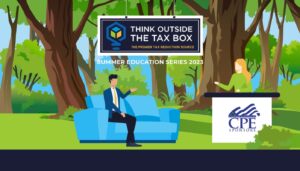
2023 Summer Education Series Event Calendar
We are so excited to announce the 2023 Summer Education Series! All summer long we will be bringing our loyal subscribers monthly webinars featuring some of the brightest minds in tax! Each webinar will feature our usual blend of high-quality education and entertainment and include continuing education credits for those who qualify. All of this is included in your regular subscription! Continue reading to see what we have in store…











